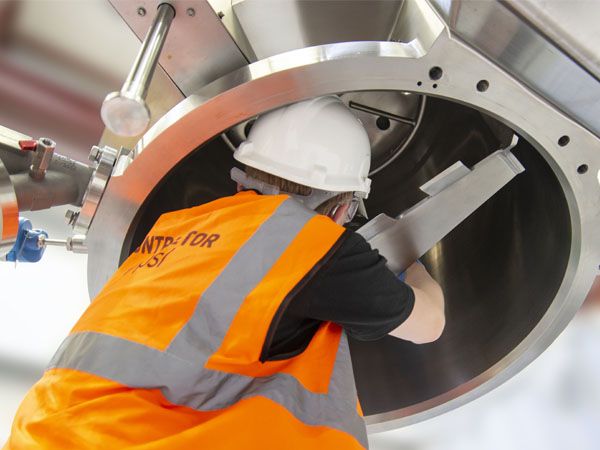
Pharmaceutical pipelines are among the most complicated product cycles worldwide. Every detail of drug discovery and development processes must be meticulously conducted to ensure business success. However, there are so many interlinking and complex aspects to the drug pipeline that seemingly routine processes can get overlooked. Preventative maintenance is one such area that is often neglected.
Adopting a preventative mindset and implementing a regular maintenance schedule is crucial for reducing the chances of equipment failure, subsequent workforce disruption, and production errors. Yet preventative maintenance is not simply about avoiding severe disruption; it allows for greater process efficiency and enhanced budget management.
In this article, we will look at the top five benefits of preventative maintenance for pharmaceutical manufacturers.
1. Reduced Risk of Unplanned Downtime
Machine repairs or upgrades are inevitable; however, by following a preventative maintenance programme, these repairs can be scheduled at a time that is convenient for the business.
One of the most difficult aspects of maintaining pharmaceutical equipment is their variety. Each machine is different and will need to be maintained based on the process it is used for, its impact on the process, and what parts it comprises.
A preventative maintenance plan will help track when specific equipment is due to be serviced. When unplanned downtime occurs, production stops suddenly, and this can cost businesses thousands in loss of profits and additional costs for repairs and employee salaries.
2. Increased Efficiency
When maintenance is planned, it allows process managers to schedule other work during the equipment ‘downtime’. This helps to limit disruptions and therefore increases efficiency across the business.
Equipment becomes more efficient when regularly maintained because parts can be cleaned, lubricated and replaced where necessary, contributing to the quality of their output.
It is also worth mentioning that critical spare parts are often left out of a pharmaceutical maintenance plan. Spare parts should be monitored, maintained and readily available should they need replacing. Otherwise, one small but vital part can halt a process and incur unnecessary costs for the company.
3. Extended Asset Lifespans
As pharmaceutical machinery is expensive, planned maintenance is crucial in extending its lifespan. A piece of equipment that is well looked after will run for longer, and performance will be of a higher quality than one that is neglected.
In this case, time-based preventive maintenance can help predict when a piece of equipment will need to be inspected or replaced based on elapsed running time. This reduces the risk of equipment being worn down to failure.
4. Enhanced Health and Safety Compliance
As pharmaceutical machinery is expensive, planned maintenance is crucial in extending its lifespan. A piece of equipment that is well looked after will run for longer, and performance will be of a higher quality than one that is neglected.
In this case, time-based preventive maintenance can help predict when a piece of equipment will need to be inspected or replaced based on elapsed running time. This reduces the risk of equipment being worn down to failure.
5. Better Budget Management
The benefits of preventative maintenance lead to one significant positive: it saves money.
As scheduled maintenance can be tracked, machinery can be serviced based on running time or production output, and any damage can be treated before a piece of equipment fails. This saves time and money compared to unplanned maintenance. Additionally, complex process equipment often has specialised custom-made parts which take weeks, if not months, to manufacture. Thus, stock control, another key aspect of preventative maintenance, must always be managed.
If a machine breaks down, the cost of repairs will be significantly higher as it could include locating specialist technicians, express delivery of necessary parts, and loss of production.
In the worst case, equipment that is not regularly maintained could break down entirely, and the cost of replacing it would be considerably higher than routine maintenance and partial replacements. In fact, unplanned shutdowns of just a few days can lead to profit losses equating to more than the capital cost of a brand-new system.
Tailored Aftercare Service and Support
Without regular maintenance equipment may not function optimally or it may become damaged, which is why Powder Systems Limited (PSL) offers expert aftercare support through our PSL Serve Team. We support clients with installations and identifying critical spare parts that are recommended to keep in stock against the machine’s lifecycle. PSL always provide introductory maintenance training for our client’s internal teams when installing equipment. This ensures they have a basic understanding of what might be foreseen and therefore consider this in their maintenance planning.
Furthermore, our database allows us to reach out to our partners months in advance of their known shutdowns, notifying them to review their spare parts inventory, order any critical parts well in advance and schedule in site visits around the shutdown periods.
Whether you need more information, a maintenance technician, or would like to purchase spare parts for your equipment, please don’t hesitate to contact our PSL Serve Team on +44 (0) 151 448 7700 or email serve@powdersystems.com
